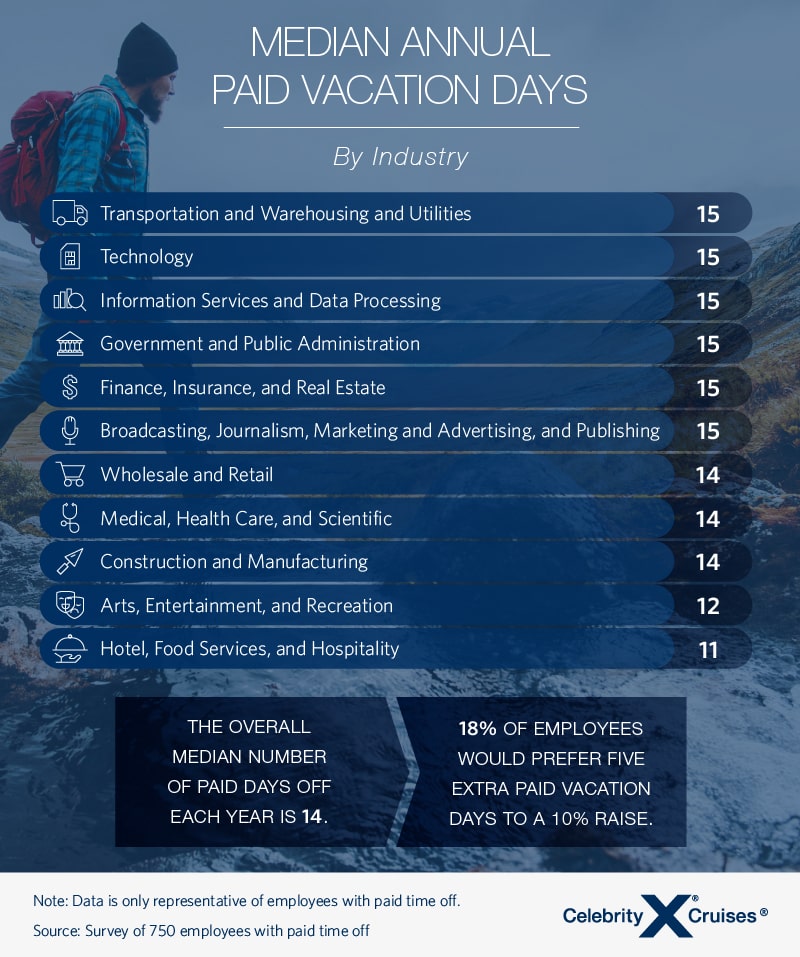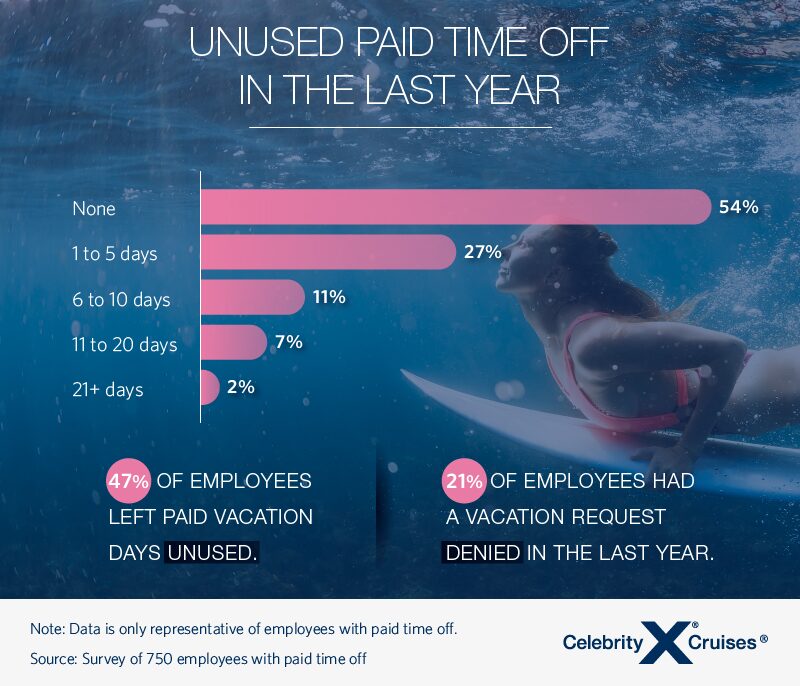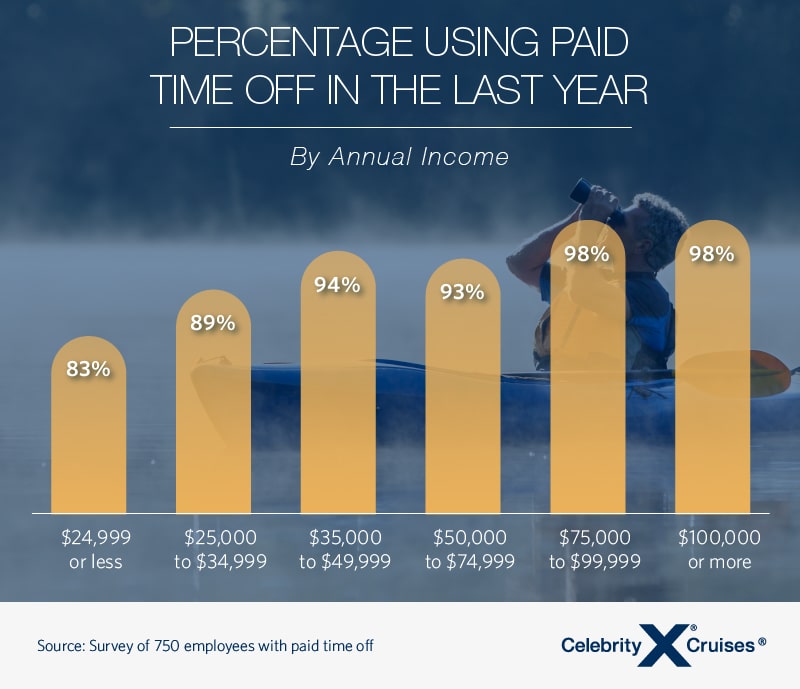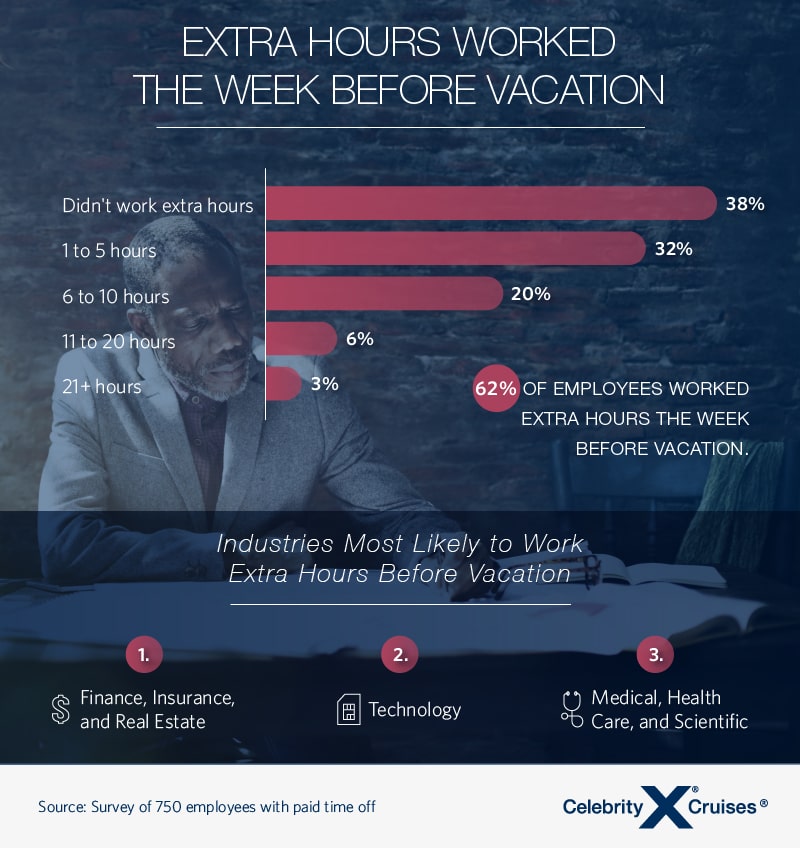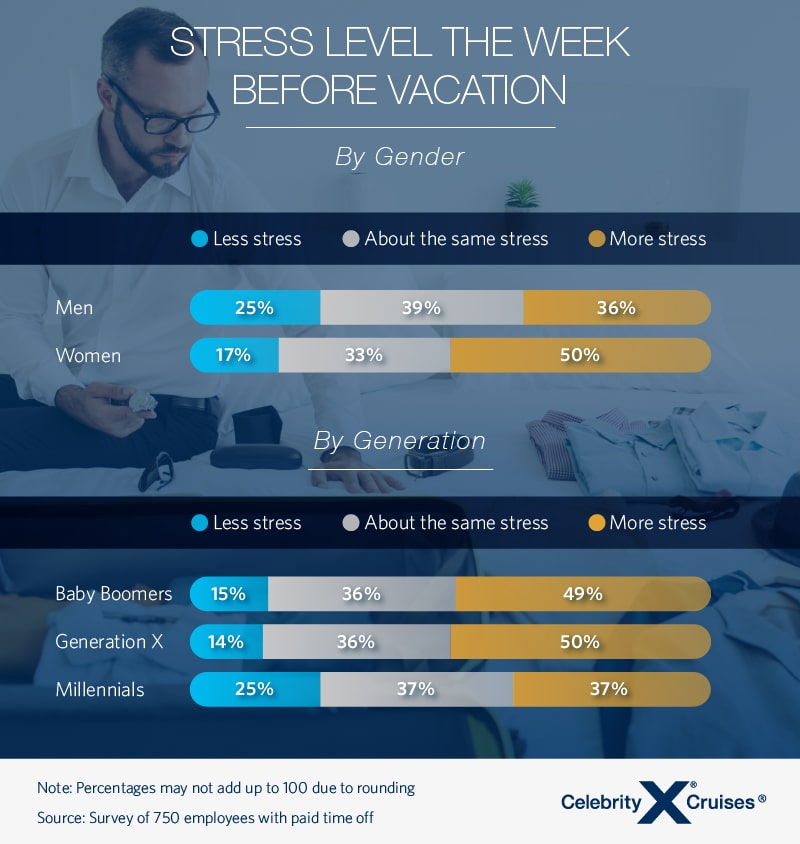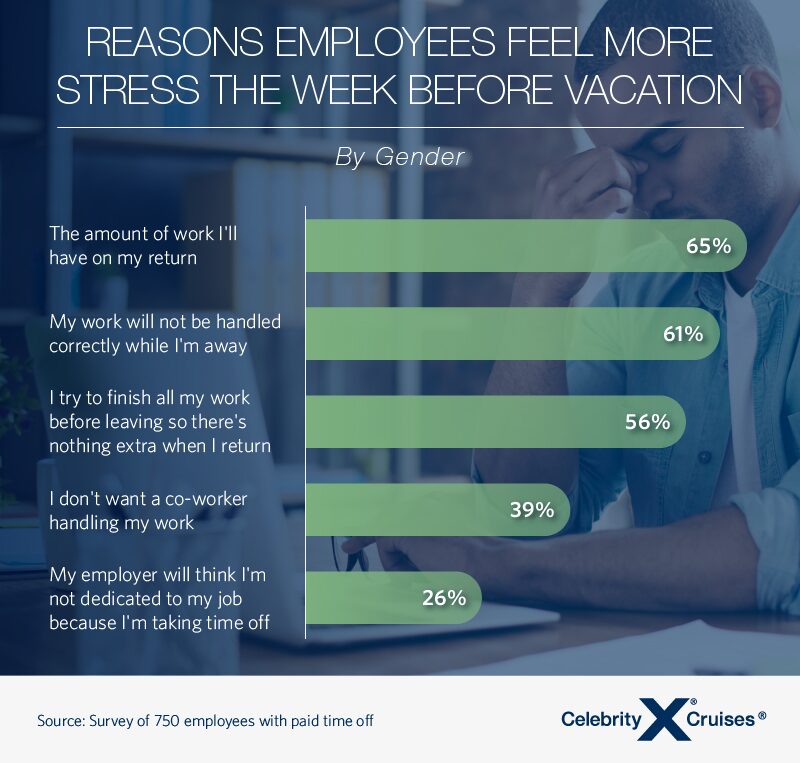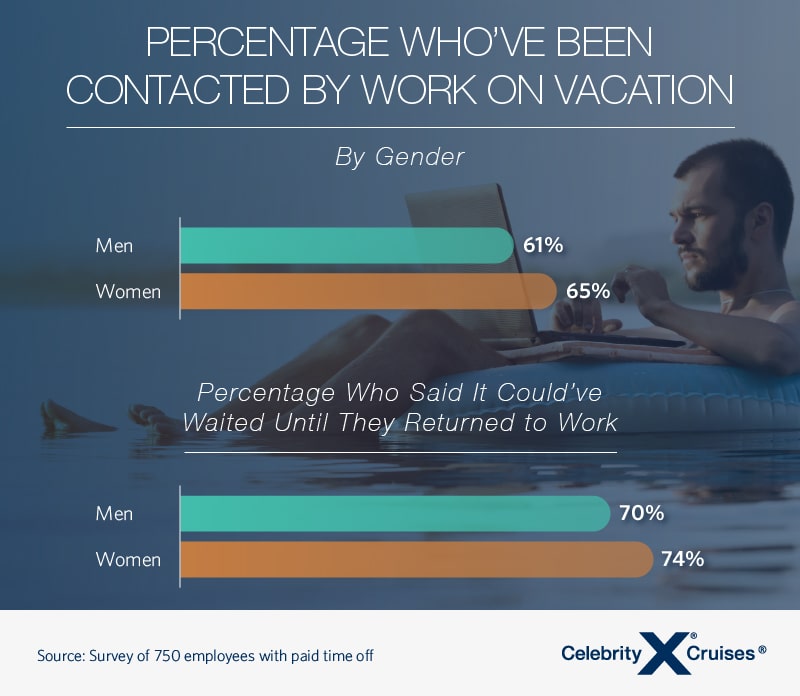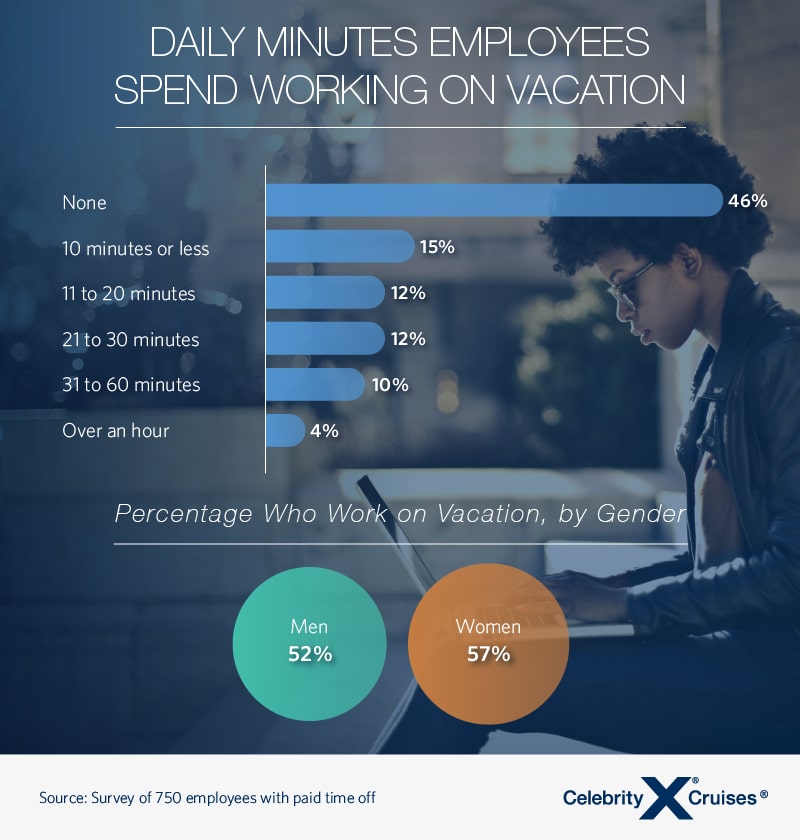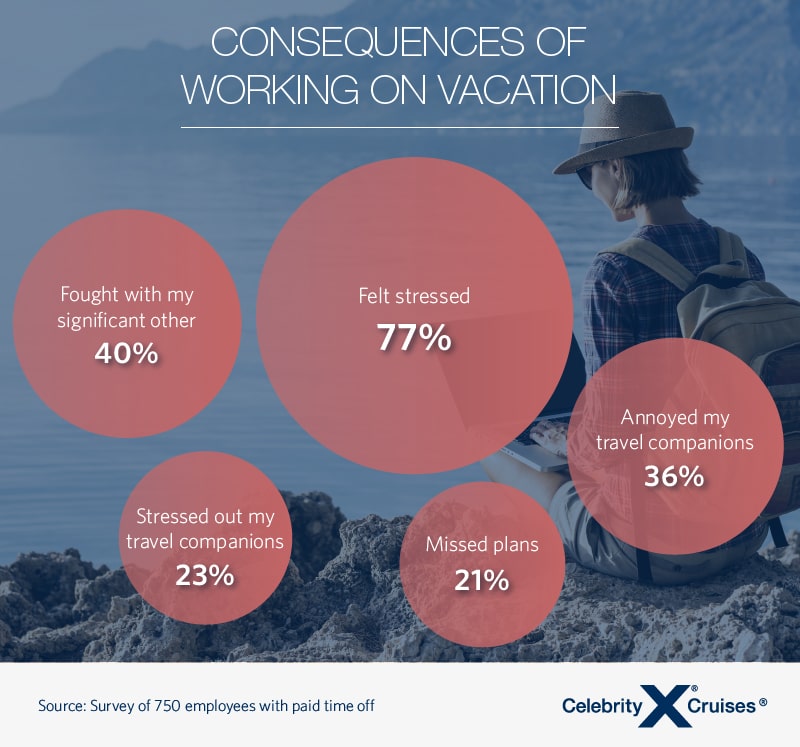Americans are notorious workaholics. An estimated 40% of employees work over 50 hours a week, and 1 in 5 people work over 60 hours a week. Whether you're laboring for love or just plain laboring, we all deserve some time off.
While employers aren't required to give paid vacation time to employees, many offer it. Some go as far as combining sick days, vacation time, and personal days under the umbrella of PTO or paid time off. A select 1% of employers have taken paid time off even further by offering unlimited days off. This should be great news for vacation-eager employees but PTO is only great if you're willing to take time off, and "out of office" means zero work communication.
To find out what it really means to be on vacation, we surveyed over 1,200 employees, 750 of who had paid time off. We asked them how much paid vacation time their job gave them and how much of that time they actually took. We looked at the major causes of vacation-related stress, such as work ignoring employees' "OOO" message. We then broke our results down by industry, gender, and generation to see how vacationing differs across the working world. Keep reading to see what we discovered about America's vacation culture.
Industries With the Most PTO
When choosing a career, did you ever consider if your industry was generous with its PTO? It turns out that some industries give employees more paid time off than others.
Of our respondents, those in the hotel, food services, and hospitality industry were given the fewest paid vacation days. These employees received only 11 PTO days annually, three days less than the median.
Meanwhile, employees in the transportation, warehousing, and utilities industry were among those given the most vacation days: 15 on average. Other industries that provided 15 PTO days included: technology; information services and data processing; government and public administration; finance, insurance, and real estate; education; and the media industry.
PTO Left on the Table
As nice as it is to be given plenty of paid time off, PTO is only as good as the days you use. Forty-seven percent of employees left paid vacation days unused. Some let upward of 21 days go to waste.
A part of the reason for this PTO negligence may be vacation shaming in the workplace. Colleagues and managers don't always respond well to vacation requests. Employees can fear using their paid time off will put their work relationships and career at risk. However vacations are good for everyone - employees and employers alike. Research has demonstrated how taking vacations improve productivity and overall mental health.
Does Salary Impact PTO Usage?
We were curious if income affects how much paid time off employees use. Does earning more encourage you to take more vacations? Or are high earners only earning so much because they work nonstop and never take vacations?
According to our survey, the more you earn, the more likely you are to use your paid time off. Nearly every respondent in the highest income brackets – those who earn $75,000 to $99,999 and those who earn $100,000 or more – used some paid vacation days last year. The lowest earners with incomes of $24,999 or less were less likely to use any paid time off.
Working Overtime Before Vacationing
Preparing for a vacation requires more than choosing a location and wardrobe. For the majority of workers, preparing for a vacation means putting in extra hours at the office. Sixty-two percent of employees worked extra hours the week before a vacation. Most worked only an additional one to five hours the week before, but some put in 21 hours or more.
For many, this is probably to ease the transition back to work after vacation. There's nothing worse than coming back from a vacation to find a pile of work waiting for you, especially when you're already fighting the post-vacation blues.
Ramping Up Stress
Feeling compelled to put in extra hours before vacation can be a major source of stress. While vacations are supposed to relieve stress, the week leading up to them can actually induce it. Fifty percent of women said they felt more stress the week before a vacation. Meanwhile, 17% of women said they felt less stress the week leading up to their vacation.
Vacations were less stressful for men. Only 36% of male workers said they felt more stress the week leading up to a vacation. Mostly, their stress level remained the same leading up to their vacation.
There was also a generational divide in how stressful workers found the week before vacation. Gen Xers were the most likely to feel more stress right before a vacation, with baby boomers not far behind. Millennials were the least likely to stress before a vacation. They were equally as likely to feel no change in their stress level as they were to feel more stress.
Vacation Stressors
What is it that causes employees to feel more stress before a vacation? We asked our survey respondents what stressors weighed on them and got some interesting answers.
For nearly two-thirds, the amount of work they'd have after returning to work was a major source of pre-vacation stress. Research has found that just thinking about the "mountain of work" they will return to after a vacation deters many workers from leaving in the first place.
To combat this, many try to finish all their work before leaving but even this was a major source of stress for 56% of workers. The solution could be to let others handle your work for you while you're away, but that could be an even more stressful thought than trying to get it all done beforehand.
For 39% of respondents, thinking about a co-worker handling their work while away was a major source of stress. Worrying that their work would be mismanaged plagued 61% of employees. Psychologists call this fear that their work will collapse without them "work separation anxiety."
A lesser but still prevalent pre-vacation stressor was the thought of what employers would think of employees' PTO requests. Over one-quarter of workers feared their employer would think they're not dedicated to their job if they take a vacation.
Vacation, Interrupted
Vacations are supposed to be a time to "unplug" and forget about work for a time. Unfortunately, for most of us, this isn't the case.
Sixty-one percent of men and 65% of women reported being contacted by work while on vacation, and most of these contacts weren't for immediate issues. Seventy percent of men and 74% of women said the communication could have waited until they returned to work.
Career experts suggest setting clear communication procedures for when you're on vacation. If you work for a large employer, the employee handbook should have a guide on how to handle – and possibly prevent – unwanted work-related communication while you're off the clock.
On the Clock When You're Off the Clock
Despite often being interrupted by work communications while on vacation, 46% of vacationers didn't work while out of the office. When people did work on vacation, it was usually for a short stint – just long enough to check an email or perhaps update that "OOO" automatic reply.
Fifteen percent of vacationers spent 10 minutes or less per day on work while they were out. Only 4% spent over an hour each day on work while vacationing. Women were more likely than men to work on vacation, but over half of both genders said they worked while on vacation.
Despite the negative consequences of working while on vacation, 18% of employees would prefer five extra paid vacation days to a 10% raise. Take that, work!
Why You Shouldn't Work on Vacation
No good deed goes unpunished, as they say. It appears working while on vacation is no exception. Seventy-seven percent of vacationers who worked while away reported feeling stressed because of it. For some, that stress even affected their traveling companions.
Working while on vacation caused fights between nearly 40% of couples. It annoyed the traveling companions of 36% of vacationers.
Set Work on Cruise Control
We crave vacations. Almost 60% of workers would take a pay cut in exchange for more time off from work. And yet, nearly half of workers let their vacation time go unused during the year. A part of the reason may be that vacations can be stressful. From thoughts of work piling up to worries that it'll get done in the wrong way, many of us struggle to unplug from work but this only makes vacationing more important.
Vacations are good for your mental and physical health. Overworking yourself increases your risk of stroke or heart attack. Vacations, on the other hand, have been linked to longer lifespans.
If you're ready to improve your well-being by disconnecting, we're here to help. At Celebrity Cruises, we aim to take the stress out of vacation planning with our unparalleled cruises. With every cruise, we strive to make positive changes in the lives of our guests. Let us make a positive change in your life. Visit CelebrityCruises.com to book your next well-deserved vacation.
Methodology and Limitations
We surveyed 1,231 employees, 750 of who had paid time off. Fifty-nine percent of our respondents were men, and 41% were women. Ages ranged from 19 to 74 with a median of 34.
Part- and full-time employees could take the survey. Respondents who were unemployed, retired, unable to work, students, or homemakers were excluded. We included an attention-check question in the survey to ensure respondents paid attention. If a respondent failed to correctly answer the attention-check question or if they were clearly not paying attention to the questions, they were excluded.
Because the methodology relies on a survey, it is susceptible to biases and influences common to any survey, such as self-reporting, recency, and telescoping. Every effort was made to portray the data in this study fairly.
Fair Use Statement
We hope you found this content as interesting and impactful as we did. We'd be glad for you to share any part of it that piqued your interest for noncommercial purposes. When you do share, we ask only that you link back to this page so that others can enjoy the data in its entirety, too.

